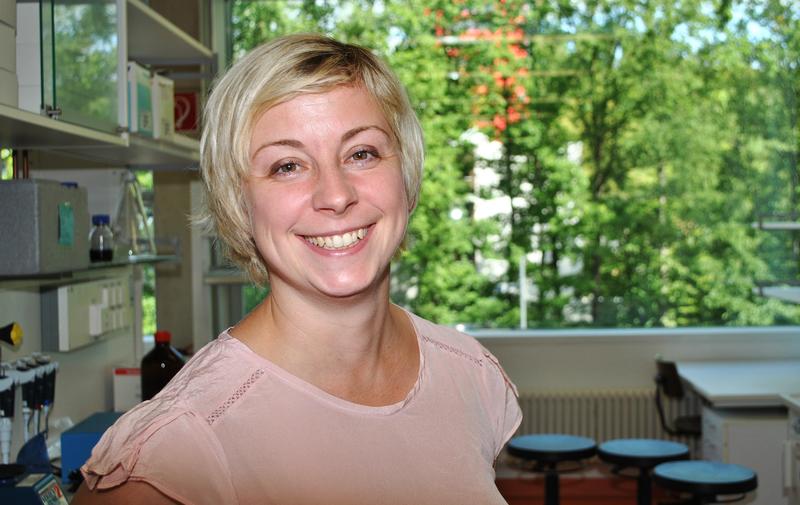

Research pharmacist Sonja M. Kessler from Saarland University has succeeded in linking a protein group to gallbladder cancer.
Ehrlich
The three proteins usually targeted by pharmacist Sonja M. Kessler in her research work are known to play an important role in embryos in the womb. These proteins help to ensure the rapid growth and development of the unborn child. After birth, however, these proteins typically play no further role.
‘All of these proteins are switched off after birth and they are no longer copied from the child’s genetic blueprint,’ explains licenced pharmacist Dr. Sonja M. Kessler, who is carrying out research at Saarland University in the group run by Professor Alexandra K. Kiemer for her Habilitation – the advanced research degree that entitles the holder to teach at professorial level within the German higher education system. However, it turns out that this family of proteins with the unremarkable names IMP1 to 3 can be switched on again. And if that happens, they can cause a lot of harm. Of the three proteins, IMP2 is particularly hostile: ‘Because IMP2 promotes cell division and proliferation, it also drives the growth of tumours,’ explains Kessler.
Research pharmacist Kessler has now succeeded in linking the protein group to gallbladder cancer. ‘We were able to identify the proteins in a large number of tissue samples from gallbladder patients. We were also able to show that the tumour grows faster when the cells contain larger amounts of the IMP2 protein. And in those cases patient prognosis is poorer,’ says Kessler.
This result from a basic research programme may in future help to improve gallbladder treatment. ‘Up until now there have been very few prognostic markers for this tumour,’ says Sonja Kessler. Prognostic markers are substances in blood or tissue samples that indicate that a malignant cancer is likely to have a poor outcome for the patient.
Currently available treatment options can therefore be tailored more closely to the patient’s needs, which may help to improve clinical outcomes. IMP2 represents an important and potentially useful prognostic marker for gallbladder cancer. The results of Kessler’s research may also provide the basis for new effective drug treatments. Once the participating protein has been identified, research can be undertaken to influence, slow or even completely prevent the harmful processes that are set in motion by the protein.
Kessler’s research was conducted in collaboration with Johannes Haybaeck, Professor of Pathology at the University of Magdeburg, who has built up the world’s largest collection of almost 500 tissue samples from gallbladder cancer patients.
With the help of the tissue bank, Dr. Kessler was able to identify the protein IMP2 as a completely new player in gallbladder cancer. Experimentally, the IMP proteins in the tissue samples were made visible and analysed with the help of marked antibodies.
Press photographs are available at http://www.uni-saarland.de/pressefotos and can be used at no charge.
Contact: Dr. Sonja M. Kessler (Department of Pharmaceutical Biology):
Tel.: +49 (0)681 302-57314; E-mail: s.kessler@mx.uni-saarland.de
Prof. Dr. Alexandra K. Kiemer (Department of Pharmaceutical Biology)
Tel.: +49 (0)681 302-57301; E-mail: pharm.bio.kiemer@mx.uni-saarland.de
Note for radio journalists: Studio-quality telephone interviews can be conducted using broadcast audio IP codec technology (IP direct dial or via the ARD node 106813020001). Interview requests should be addressed to the university’s Press and Public Relations Office (+49 (0)681 302-64091 or -2601).
http://www.impactjournals.com/oncotarget/index.php?journal=oncotarget&page=a… – “IMP2/IGF2BP2 expression, but not IMP1 and IMP3, predicts poor outcome in patients and high tumor growth rate in xenograft models of gallbladder cancer” DOI: 10.18632/oncotarget.21116












